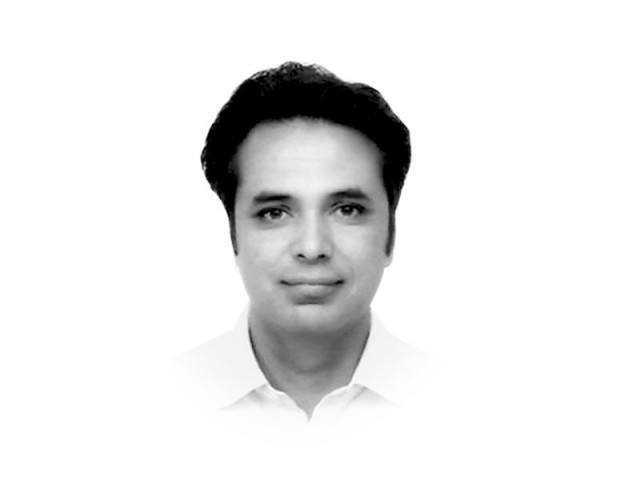The IRI survey and the PTI
From the public's point of view PTI is becoming a bit of habitual late-comer, or simply never arrives when it should.

The writer is a journalist and works for Express News
Several factors seem to have converged to subvert the PTI's upswing whose best display was its large gatherings in Lahore, Karachi and Quetta. The party has not taken complete organisational shape yet. Its internal elections — an admirable achievement — do not resonate with the role powerful political forces are expected to play in today's Pakistan. The country is desperate for a strong and stable leadership to emerge and blow away doomsday scenarios being built all around. The we-mean-business image isn't there about the PTI as it struggles to evolve structures at the grass roots level that should eventually stamp its presence on the minds of the voters with enough consistency to dilute their doubts about whether the party is real or ephemeral.
These delays in finalising the look and shape of the party are in turn due to the stark differences and strong power play at the top party echelons. For an organisation that is yet to see the inside of parliament except for the lone victory of Imran Khan in the 2002 elections, the PTI's top brass is remarkably divided. Here, three powerful groups (the Old, the New, and Khan's friends) seldom coalesce and mostly collide when it comes to setting the direction of the party. Official positions are easily overrun by unofficial weight-pulling, which is done in ways too many to name. Meeting different people from these different and differing groups makes one feel as if they represent not one, but three parties. This diversity could have been turned into political bounty if Imran Khan had mediated well and was hands-on, on a day-to-day basis, in running the affairs of the party. After all, the more diversity, the wider the net of party appeal across the spectrum of competing views. That has not happened. So, from who will sit next to the Khan (as he is generally called) in a press conference to whose research is more credible on a particular subject of national importance, decisions on a broad range of issues are left to chance, or hurriedly-called meetings that produce more divisive talk than coherent suggestions. Normally, in the end the Khan decides what to do and what to say.
And this is where the biggest problem of the PTI rests: over the months, Imran Khan has said a lot and done little, making his most ardent supporters wonder whether even 25 per cent of what has been committed in public is even marginally doable. Take the issue of the PTI's long marches, whether threatened, promised or attempted. The list is long and has an incredible variety of events that provoked the PTI leaders to saddle up the horse of protest and then get off it after enjoying a brief, light trot. The tsunami forecast has not yielded any result even though it has been made time and again. Nor has anyone tried to explain to a bewildered public that this refers to Imran Khan's assessment of sweeping the elections and not the coming of a strong wave of street agitation, which if it were to happen, would be as much cathartic for them as productive in terms of seriously challenging the present set-up.
So, from the public's point of view (and that is what reflects in the IRI survey), the PTI is becoming a bit of a habitual late-comer, or it simply never arrives when it should. The party has not been seen organising any public activity of impact over the crippling gas crisis, for example. Combating corruption, loot and plunder is mere stuff of statements. Inflation, the killing fields of Karachi, the flood-devastated lands of interior Sindh, the political and administrative wreck that Balochistan has become, girding poverty and widespread hopelessness are all things that matter to the public. They want to not just hear an alternative narrative but also see it shape up before their eyes. They would happily be inclined to board a ship whose course is set and destination is marked. The PTI, for all the hard work that its cadres have put in, especially the youth, has not become that ship yet. Closer to the elections when the public begins to see things in black and white, the expectation is that voting choices before them should also be properly formed ones. Fuzziness wins no hearts come election time. The PTI can only reverse the declining trend of public approval by defining itself and by walking its talk.
Published in The Express Tribune, January 31st, 2013.















COMMENTS
Comments are moderated and generally will be posted if they are on-topic and not abusive.
For more information, please see our Comments FAQ